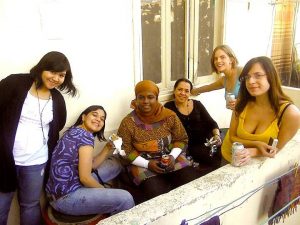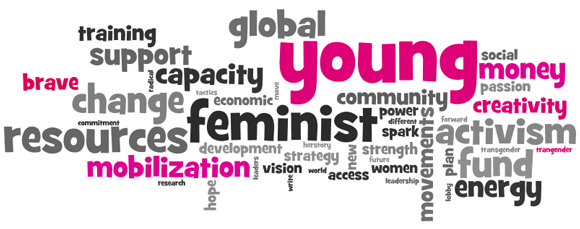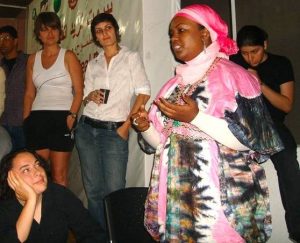By Amina Doherty
 As I travelled to Beirut in November 2010 I had the feeling I was about to be a part of creating something with the potential to be very very big. The meeting, convened by the Association for Women’s Rights in Development (AWID) and the Central American Women’s Fund, brought together an energetic group of eight young feminists from Africa, Asia, The Middle East, Latin America, the Caribbean, The United States, and Eastern Europe to share ideas, discuss, debate, and work together to refine the vision, mission and primary goals of a new fund that would serve the needs of young feminists globally.
As I travelled to Beirut in November 2010 I had the feeling I was about to be a part of creating something with the potential to be very very big. The meeting, convened by the Association for Women’s Rights in Development (AWID) and the Central American Women’s Fund, brought together an energetic group of eight young feminists from Africa, Asia, The Middle East, Latin America, the Caribbean, The United States, and Eastern Europe to share ideas, discuss, debate, and work together to refine the vision, mission and primary goals of a new fund that would serve the needs of young feminists globally.
As a group we reviewed what we knew: that young feminists are organizing around diverse issues, often in difficult and restrictive contexts and that our ability to raise resources is often limited, especially when questions of age, experience and capacity are weighted against us. We sought to question the possibilities that could emerge if progressive young women’s activists received the resources needed to help tackle social and economic inequalities, confront fundamentalisms, and address the impacts of global concerns such as armed conflict and environmental justice. We discussed the opportunities a fund like this could provide for young feminist activists to influence international funding agendas, and to mobilize additional resources for our movements. We explored the possibility of creating a funding mechanism that would address some of these issues and that would be developed by and for young feminists themselves.
In the beginning we spent time discussing and unpacking the results of AWID’s 2008 “Where is the Money for Women’s Rights” (WITM) research and AWID’s 2010 Young Feminist Activism (YFA) global survey on funding and resource mobilization for young women active in promoting and establishing women’s rights. Feedback from this research illustrated just how difficult it is for young feminist activists to gain access to donors, raise seed money for their work and get support from more established organizations within the women’s movement. According to the WITM research for example, we saw that “lack of access to funding” was cited as one of the most significant challenges for organizations working with young women. Results from both of these surveys outlined a clear need and value in having a donor that is able to meet the specialized needs of young feminist-led organizing.
Over three days, our group spent time outlining our visions for a fund that would strengthen and support a younger generation of feminist activists and that in a much broader sense would contribute towards a strong, well-resourced and multi-generational women’s movement. We elaborated on a vision of the kind of movement that the fund would contribute to: one that was inclusive, fun, self-critical and progressive in its politics and values.
“We all dream of and actively work for progressive social, economic and political transformations and the full realization of women’s rights. We need strong powerful women’s movements to make this change happen and I believe that this Fund can contribute to that.”
We talked about our dreams for building a culture of resources mobilization that recognized ‘resources’ as more than just money – and how the fund could act as a platform for building a more democratic culture of dealing with resources within our feminist movements.
What are some of the things money can’t buy?
Solidarity :: Teamwork :: Commitment :: Politics :: Passion :: Support System(s) :: Connections :: Friendships :: Confidence :: Trust
We talked about wanting to transform power relations between ‘donors’ and ‘grantees’ by employing a model of shared decision-making where grantees get to decide collectively what issues and groups should get funded.
As with all processes the group shared several creative tensions as we discussed challenges such as the reach of our fund – how with limited resources of our own overcome challenges of location, language and communication; how we would strive to bring “new” resources to our feminist organizing, how we would support young people’s activism without reinforcing the concept of “youth” as an identity, the size and frequency of grantmaking among other things. We acknowledged the importance of these challenges and agreed to design the fund in ways that sought to address these tensions without being held back by them.
We shared our experiences as youth organizers, grantmakers, and activists and discussed how our experiences in these various would help guide the future direction of our Fund. At the end of our meeting we came to agreement around the values and politics that would inform the Fund.
Flexibility in all of our systems and processes…
Resources that are varied and that contribute to stronger feminist movements globally…
Inclusivity across a broad range of identities…
Diversity in levels of action and forms of organizing…
Action and accountability to the political visions and agendas we are seeking to promote…
As feminists, we discussed the importance and political implications of such an exercise as naming. Reflecting on discussions on the power of words and naming we returned to the question of what we would call the fund. We discussed the implications for mobilizing resources from donors that may be “uncomfortable” with us using the term “feminism” but also among groups of young women that struggle to self-identify as such.
We brainstormed ideas and words that we felt evoked the spirit of the fund’s vision, and also flagged the importance of considering how any name chosen would translate in different languages.
As part of this process we decided to put a call out for names on the AWID Young Feminist Wire and suggestions poured in from all corners of the globe. Some of the final contributions selected by the advisory group included:
• The Dada Fund: ‘Dada’ being the Swahili for ‘Sister,’
• The Jangabi Susu Fund: “Jangabi” originating from the Wolof word for young woman and “Susu” being a process recognized in parts of Africa and the Caribbean as a form of resource mobilization.
• The ‘F’ Fund or Fondo Feminista
• The Lola Fund: “Lola” meaning young woman in some iterations of Spanish, and a common name in Central Asia meaning “flower” in Uzbek.
After much debate it was agreed that our core values would form an acronym for the Fund. We would call ourselves:
FRIDA | The Young Feminist Fund.
Flexibililty • Resources • Inclusivity • Diversity • Action
Flexibilidad • Recursos • Inclusividad • Diversidad • Acción
Flexibilité • Ressources • Inclusivité • Diversité • Action
Гибкость – Ресурсы – Сопричасность – Разнообразие – Действие
المرونة . الموارد . الادماج . التنوع . العمل
Though there were concerns about whether the name would be seen as a form of tribute to Frida Kahlo, and we struggled with the possibility of the Fund being identified with one individual (and region), we also valued the connection with Frida known globally for her inspiring and passionate work as an artist but also an important non-conformist revolutionary figure. After further discussions we discovered that the name Frida is popular in many languages around the world with a broad range of meanings from ‘Peaceful Leader’ to ‘beautiful, beloved.’
At the end of the day, we agreed on the name – FRIDA to represent a fund that would employ a feminist approach to its grantmaking and overall strategies. We acknowledged that different groups and individuals will have different understandings of what feminism means and that many groups will choose not to self-identify as “feminist”, but as a fund FRIDA would be committed to supporting groups and initiatives whose political vision is in line with the vision the Fund is promoting. We talked about the power of reclaiming the word ‘feminism’ in our fund’s name, and standing by a name that is reflective our core values and principles.
Although we had many questions together we knew that we were well on the way to creating a fund that fit within our vision(s). We were creating a fund that would support young feminist activism as a critical part of building amazing, powerful, strong, and effective women’s movements and activating our collective power for women’s rights and gender equality.
 As we launch the FRIDA website and begin our preparations for the first round of grantmaking, I look back on the amazing journey FRIDA has already had. Even amidst a climate of economic uncertainty that pervades funding sectors, our enthusiasm for FRIDA remains strong. We are encouraging donors and funders that are really committed to supporting progressive social change to step up to the challenge that young feminists have set for them because we’re about to be part of something inspiring! Looking back on that first meeting in Beirut, I feel incredibly inspired by our ‘feminist alchemy’ and the notion that we were part of creating something unique and very special.
As we launch the FRIDA website and begin our preparations for the first round of grantmaking, I look back on the amazing journey FRIDA has already had. Even amidst a climate of economic uncertainty that pervades funding sectors, our enthusiasm for FRIDA remains strong. We are encouraging donors and funders that are really committed to supporting progressive social change to step up to the challenge that young feminists have set for them because we’re about to be part of something inspiring! Looking back on that first meeting in Beirut, I feel incredibly inspired by our ‘feminist alchemy’ and the notion that we were part of creating something unique and very special.